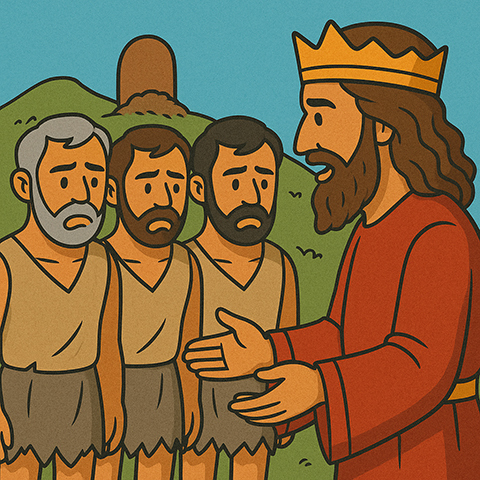May 11th


Today’s reading comes from 2nd Samuel 10, 1st Chronicles 19, and Psalm 20. These passages demonstrate how David and those closest to him were committed to doing what was right—and because of that, they found favor in God’s eyes.
The same account is told in 2nd Samuel and 1st Chronicles of the kind and loyal King Nahash of the Ammonites who died. David responded with the same kindness and loyalty to his friend, sending men to offer condolences to Nahash’s son, Hanun. But instead of receiving David’s kindness, Hanun reacted with suspicion. He accused David of deception and treated his messengers disgracefully, believing they were spies preparing for an attack.
Ironically, it turned out that the Ammonites became the aggressors. Realizing they had deeply offended David and Israel, they doubled down by making an alliance with Syria and set themselves up in battle array against Israel. Joab, the commander of David’s army, divided the Israeli forces between himself and his brother Abishai. Joab encouraged the troops prior to battle with these words,
“Be of good courage, and let us be courageous for our people, and for the cities of our God, and may the Lord do what seems good to Him.” —2nd Samuel 10:12 (cf. 1 Chronicles 19:13)
Israel’s leaders understood their desperate need for God. The battle wasn’t theirs alone—it was God’s. The mission to drive out the enemy and secure the land was given to Israel from God (see Deuteronomy 7:1–2; Numbers 33:50–56). When they obeyed God’s commands, He worked on their behalf, accomplishing His perfect will through their faithfulness.
David would later capture this heart of dependence in song,
“Some trust in chariots and some in horses, but we trust in the name of the Lord our God.” —Psalm 20:7
That same trust is what God desires from us today. When we’re faced with decisions that force us to choose between what God desires and what we—or others—want, what will we do? Will we choose faithfulness over financial gain? Loyalty and kindness over self-righteous vengeance? Dependence in God or reliance on our own strength?
Takeaway: God is worthy of our choice to wait on Him for provision, protection, and prompting. When we place our trust in ourselves or in alliances with others rather than in Him, we are choosing what is temporary over the eternal. But when we wait on the Lord, we are believing that He is the One who ultimately overcomes. This reminds me of another popular psalm,
“Be still, and know that I am God. I will be exalted among the nations, I will be exalted in the earth!” —Psalm 46:10
Let’s be found faithful—waiting, trusting, and standing on the winning side.